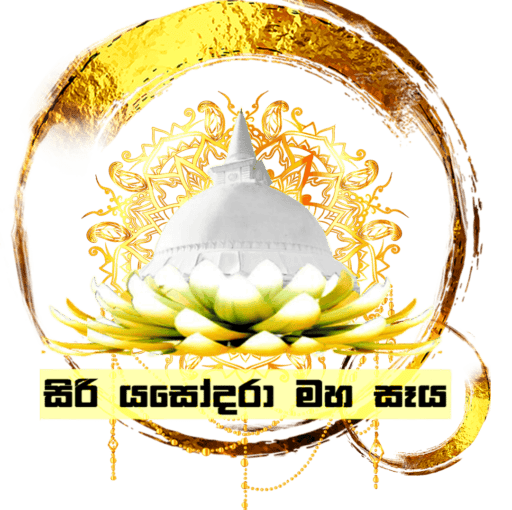Mahāpajāpati Gotamī Therī
Part -4
Ordination of One Thousand Sakyan Princes by the Buddha
Having thus established His father, King Suddhodāna at the Three Fruition stages (sotāpatti-phala, sakadāgāmī-phala and anāgāmī-phala), the Buddha left Kapilavatthu in the company of twenty thousand Arahats and journeyed towards Rājagaha. On arrival at the Anupiya mango grove of the country of Malla, the Buddha broke the journey for some rest.
At that time, King Suddhodāna summoned an assembly of all the members of the royal Sakyan clan and addressed them:
“O you members of the royal Sakyan clan, if my son had chosen to remain as a sovereign ruler, seven Treasures would have appeared and he would certainly have become a Universal Monarch ruling over four island continents. And my grandson Rāhula, befitting the eldest Son Treasure (of the seven Treasures) would have to accompany the Universal Monarch together with all the Khattiya rulers on earth, attending to administrative matters wherever the Wheel Treasure rolled on. You all Sakyan rulers are well aware of this.
Now that my noble son became the Buddha, the Crown of the three worlds, (He being a Buddha of royal descent), let only princes of royal blood attend upon Him. I would urge you, therefore, that each and every royal household present me a prince. (I will arrange for their ordination in the presence of my son the Buddha).”
They all readily signified their assent by saying: “Very well, your Majesty” and one thousand princes of the royal families spontaneously went along with the King to the Anupiya Mango Grove and received ordination from the Buddha.
Six Princes who had not being ordained
At the ceremony of the palm-reading, after the birth of the Bodhisatta, all the members of eighty thousand royal families had made the promise: “Whether he becomes a Universal Monarch or a Buddha, we will see to it that he goes about duly attended on exclusively by the royal princes.” Although quite a number of Sakyan princes had received ordination, six princes, namely, 1.) Prince Bhaddiya (the one taking his turn to rule at the time), 2.) Prince Anuruddha, 3.) Prince Ānanda, 4.) Prince Bhagu, 5.) Prince Kimbila, and 6.) Prince Devadatta were discovered by other Sakyan families as not honouring the promise. They censured and expressed their disapproval saying: “We all have had our sons ordained but these six princes have behaved as if they are strangers and not relatives; how dare they remain not receiving ordination?”
Whereupon, Prince Mahānama went to his younger brother, Anuruddha and consulted with him saying:
“My dear brother Anuruddha, no member of our family has yet received ordination, and it will only be right and proper for either of us to receive ordination.”
It is to be stated here that Prince Anuruddha was an extremely gentle person, born and brought up in great wealth and luxury. Anuruddha was a prince who had not heard of the term ‘have not’, and was ignorant of its meaning.

-
Save
Prince Anuruddha who did not know The Term ‘Have Not’.
One day, these six princes were playing at a stake that the loser should provide cakes.
Anuruddha eventually lost the game and as previously promised, he was obliged to send an attendant to his mother for a supply of cakes. His mother arranged to provide the cakes as requested.
The six princes happily enjoyed the cakes and went on playing, game after game. Anuruddha was the loser all the time and his mother had to fulfill his request three times in succession. But when he sent his attendant for the fourth time, his mother was compelled to give the answer: “Puva natthi” meaning “no cakes.”
As Prince Anuruddha did not understand the meaning of the word ‘Have not’, he thought it to be a cake of some sort, so he sent the attendant back with instructions to bring that ‘have not’ cakes. His mother, being well aware of the fact that his son was totally ignorant of the term ‘have not’, considered that she would teach him the meaning of ‘have not’. So, she expediently put one empty golden cup as a cover upon another and sent them to her son.
Whereupon, the guardian devas of the city remembered the meritorious deeds of Anuruddha in a previous existence: “As Annabara, a poor person, he liberally offered his hard earned quota of meal to a Paccekabuddha named Uparittha, saying his wish: ‘May I be free from want, not ever hearing the words ‘have not’, not knowing even the source of food (cooked rice).’ The devas were aware that they might not be allowed to attend the assembly of celestial beings if they let Anuruddha see the empty cups;above all their heads were liable to be split into seven pieces for such an act of omission. Therefore, they filled the empty golden cups with celestial cakes.
At the game pitch, as soon as the cup which was full of celestial sweet-meats was opened, the atmosphere of the whole city became laden with its fragrance; and the flavour of the ambrosia permeated the seven thousand palatal nerves of Anuruddha as he placed a bit of it in his mouth.
Anuruddha thought to himself: “Till such a long time as this, my mother has not cooked me this ‘Have not’ cake. She does not seem to love me. From now on, I will eat no other kind of cake except this kind.”
On his arrival at the palace, he asked his mother: “O mother do you really love me or not?”
His mother replied: “My dear son, Anuruddha, just as a man who has only one eye values and cherishes it most, so I love you more than anything else; more than my heart.”
Then Anuruddha asked again: “O mother, why, though loving me so, have you never prepared such a cake for me for such a length of time?”
When his mother heard this curious question, she summoned the young attendant and asked him: “Young man, was there anything in the cup?”
He replied: “O dear mother, the cup was filled to its brim with the sort of sweet meats which we have never seen before.”
His mother then realized that her son must be a man of power and glory, who had accumulated much merit from his past good deeds. She rightly considered the truth of the matter that celestial beings must have put celestial sweet meats in the cup and sent it to the prince.
Then Anuruddha told his mother: “O mother, from now on I shall not eat any eatables except this ‘Have-not’ cakes. Just cook only this ‘Have-not’ cake for me”.
Since that time on, his mother simply sent an empty cup covered with another whenever request came from his son for a supply of eatables. Before his ordination, all through his layman’s life, it was the celestials who had his cakes sent to him. How then could Anuruddha, who did not even understand the term ‘have not’, understand the state of monkhood or ordination?
Such being the case, Anuruddha asked his eldest brother, Mahānama: “O brother, what do you mean by ordination, what is it like?”
Mahānama replied: “Dear brother, one who receives ordination is required to have his hair and beard shaven clean, wear dyed clothes, sleep on a wooden bed-stead, or a couch of cane or bamboo, go on usual round for alms-food; this is the life of one who receives ordination.”
Anuruddha then made this reply: “O elder brother, I am a gentle and delicate person; I cannot lead the life of one who receives ordination.”
Mahānama said in reply: “My dear Anuruddha, if that is the case, you had better learn the business of human affairs and stay to manage our household because it is imperative that between we two brothers, one must receive ordination.”
Anuruddha then enquired: “O elder brother, what is meant by ‘business of human affairs?’ ”
How would a man of high birth like Anuruddha, who had no knowledge of the source of daily meal, understood the business of human affairs!!!
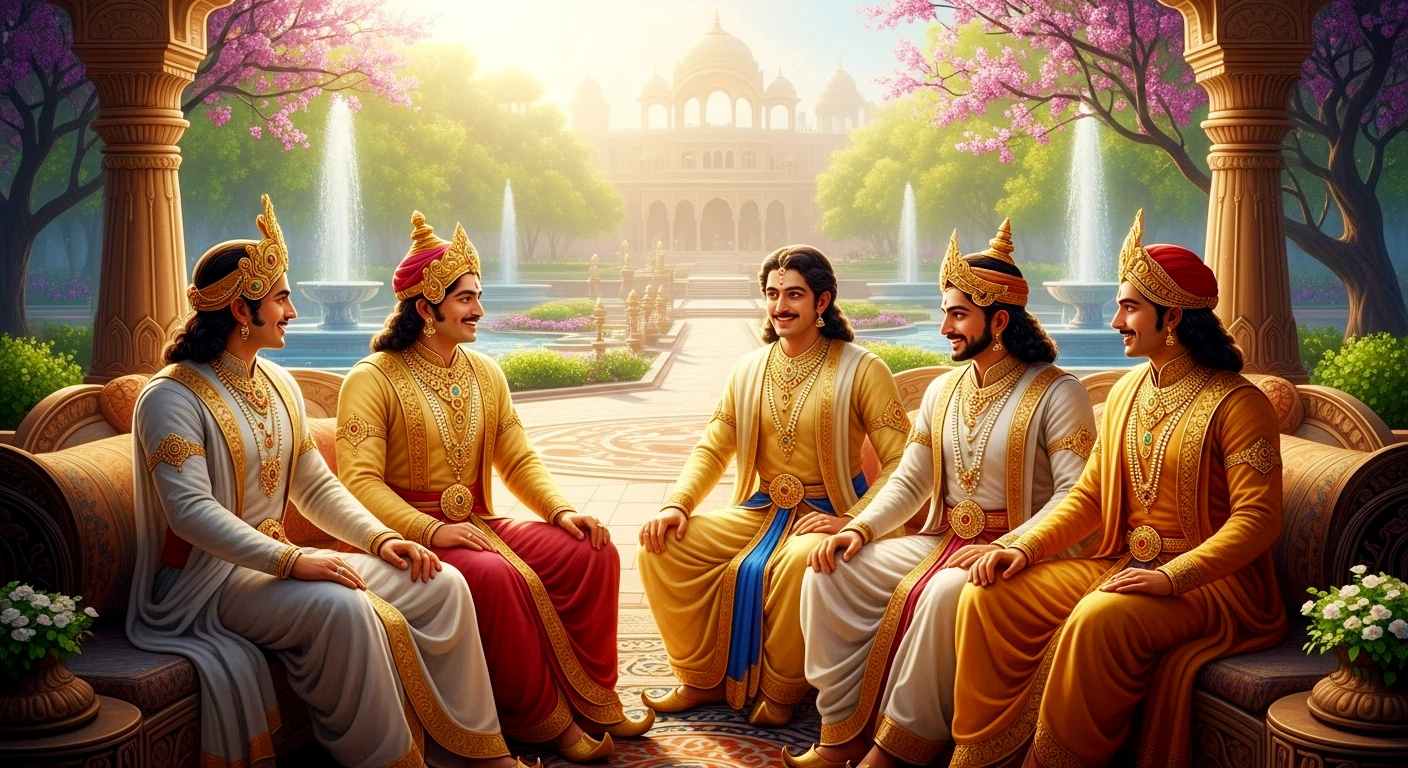
-
Save
Anuruddha and Other Princes were ignorant of The Source of Food
Three princes, namely, Kimbila, Bhaddiya, and Anuruddha happened to discuss the source of food during a conversation. Prince Kimbila maintained that a granary is the source of food. Because this prince had only seen the grains taken out of the King’s granaries; he had never seen the rice fields.
Prince Bhaddiya rejected his statement by saying: “You really do not know the actual source of food, remember a cooking pot is the actual source.” Because this prince had only seen food in the process of being cooked in a pot; he had never seen paddy being harvested in the fields or being taken out of the granaries.
Anuruddha took his turn saying: “Both of you are ignorant of the source of food; its source is a gold dish studded with fine jewels.” Prince Anuruddha had never seen paddy being taken out from the granaries, nor rice being cooked in a pot and ladled out from it, he had only seen a gold cup filled with cooked rice which was previously removed from the pot. He had therefore the fixed idea that “food spontaneously appears in the cup when he feels like eating”
These three princes were totally ignorant of the source of food (cooked rice) and so Anuruddha asked his brother: “O elder brother, what are those business of human affairs?” in honest simplicity.
Prince Anuruddha became Tired of The World
Elder brother Mahānama said: “My dear younger brother, Anuruddha, come, I will teach you the work and business of human affairs:
(1) One must plough the land at the break of the rains;
(2) Ploughing must be followed by sowing seeds;
(3) After sowing, the field must be watered (having due regard to appropriate time);
(4) Water must be led off or drained (at the appropriate time);
(5) After draining off the water, there must be constant removal of weeds.
(6) After frequent clearing away of weeds, crops must be harvested as soon as they are matured and ripened;
(7) After harvesting, standing sheaves of paddy must be caned to the threshing floor;
(8) The sheaves of paddy must be spread and piled for threshing.
(9) After spreading, the sheaves threshing must be done thoroughly;
(10) After threshing, stalks must be removed after thorough shaking.
(11) Then the undeveloped grains must be sorted out.
(12) Winnowing must be done after removing the undeveloped grains.
(13) After winnowing, the paddy must be stored in granaries.
(14) When every thing is done as described above, the same routine of work must be carried out year after year.”
On hearing this, Anuruddha told his brother: “O elder brother, all this business of human affairs are inexhaustible and never ending. When can all these worldly affairs be exhausted, when can we see the end to all these affairs? When shall we be able to enjoy the five sensual pleasures with ease and comfort, without having to encounter the anxieties of worldly life?” He muttered this with dismay and weariness.
His elder brother then told him: “Quite so, dear brother Anuruddha, worldly affairs are inexhaustible and without an end. Our fathers and grand-fathers had died before these human affairs could be exhausted or ended.”
Whereupon Anuruddha said: “O elder brother, if this be so, since you understand the ways of human affairs, you had better remain and take charge of the management. I shall renounce the household life and lead the homeless life of a recluse,” thus giving his assent to receive ordination.
Anuruddha then approached his mother and asked: “O mother, I wish to receive ordination; kindly grant me your permission to do so.”
Then the Queen Mother replied: “My dear son, Anuruddha, I love both my sons, you two brothers, with an exceedingly great love. Even when death separates us, it will be without my consent. How can I, still alive, give you both brothers my permission to receive ordination (it is an impossible matter.)”
Anuruddha made a second attempt to get his mother’s permission, but received the same answer. Again, for the third time, he requested his mother’s permission for his ordination.
At that time, the Sakyan prince, Bhaddhiya, was holding the reins of government over the Sakyan clan. (King Suddhodāna, who was by then approximately ninety, was merely a guide and figure head). The ruling King, Bhaddiya, was Prince Anuruddha’s intimate friend. The Queen Mother thought to herself: “At present, my son Anuruddha’s friend, the Sakyan King, Bhaddhiya, is still ruling over the Sakyan royal clan. That King Bhaddiya cannot, by any means, receive ordination, at least for the time being.”
So she told Anuruddha: “My dear son, Anuruddha, you have my permission to receive ordination, if your play-mate the Sakyan King, Bhaddhiya, is also prepared to receive ordination.”
Anuruddha then approached his friend and requested: “O my dear friend Bhaddhiya, my receiving of ordination is depended to you.”
Bhaddiya then said in response: “O dear friend Anuruddha, if there is a relationship between your ordination and myself, let it no longer exist. You and I…..” (Here what Bhaddiya actually meant to say readily with love for his friend, was “You and I, both, will receive ordination together,” but being restrained by attachment to the luxury of kingship, he stopped short with ‘You and I’ and said:) “You may happily receive ordination as you please.”
Nevertheless, Anuruddha made a fresh request: “Come, my dear friend, let us receive ordination together.”
Whereupon Bhaddhiya gave his frank answer: “My dear friend, Anuruddha, I cannot receive ordination, but I am prepared to do whatever I can, in matters concerning a friend, other than receiving ordination. (As regards ordination), do please receive it by yourself.”
Whereupon, Anuruddha asserted: “My friend, my mother had said: ‘If your friend, King Bhaddiya, is prepared to receive ordination, you may do so.’ O friend Bhaddiya, you had said: ‘O friend Anuruddha, if there is a relationship between your ordination and myself, let that relation no longer exist. You and I…… You may happily receive ordination as you please.’ (Almost at the point of gratifying my wish) you prevaricated and you have spoken evasive words to escape commitment. O friend, Bhaddiya, do let us go… let us both receive ordination.” Anuruddha thus persistently insisted to make refusal impossible.
(People of that time spoke the truth; they admired the truth. They were noted for being as good as their words; they always stood by their words.)
King Bhaddhiya said: “My dear Anuruddha, please wait for seven years and we will both receive ordination then.”
“My dear Bhaddhiya, seven years is too long; I cannot wait for such a long time,” replied Anuruddha. Bhaddiya said in reply: “Please wait for six years,” and then successively five, four, three, two, one year reducing a year each time; “At the end of one year, we will both receive ordination.”
But Anuruddha insisted: “O my dear friend, Bhaddiya, one year is too long a time; I cannot wait for that long.”
Bhaddhiya then asked Anuruddha to wait for seven months; they would then both receive ordination. Anuruddha again replied that the period of seven months was a long time; he could not wait for such a long time. Bhaddhiya eventually reduced the period of grace from seven to six, five, four, three, two, one and lastly half a month (fifteen days). But Anuruddha would not give in and again said fifteen days too was still a very long time and he could not wait that long.
At last King Bhaddhiya (as a final proposal) asked for seven days grace to enable him to relinquish the duties of a king and hand over the affairs of the state to his son, elder and younger brothers. Anuruddha was satisfied and said: “My dear Bhaddhiya, seven days is not too long a time; I will wait for seven days,” and they came to a mutual agreement.
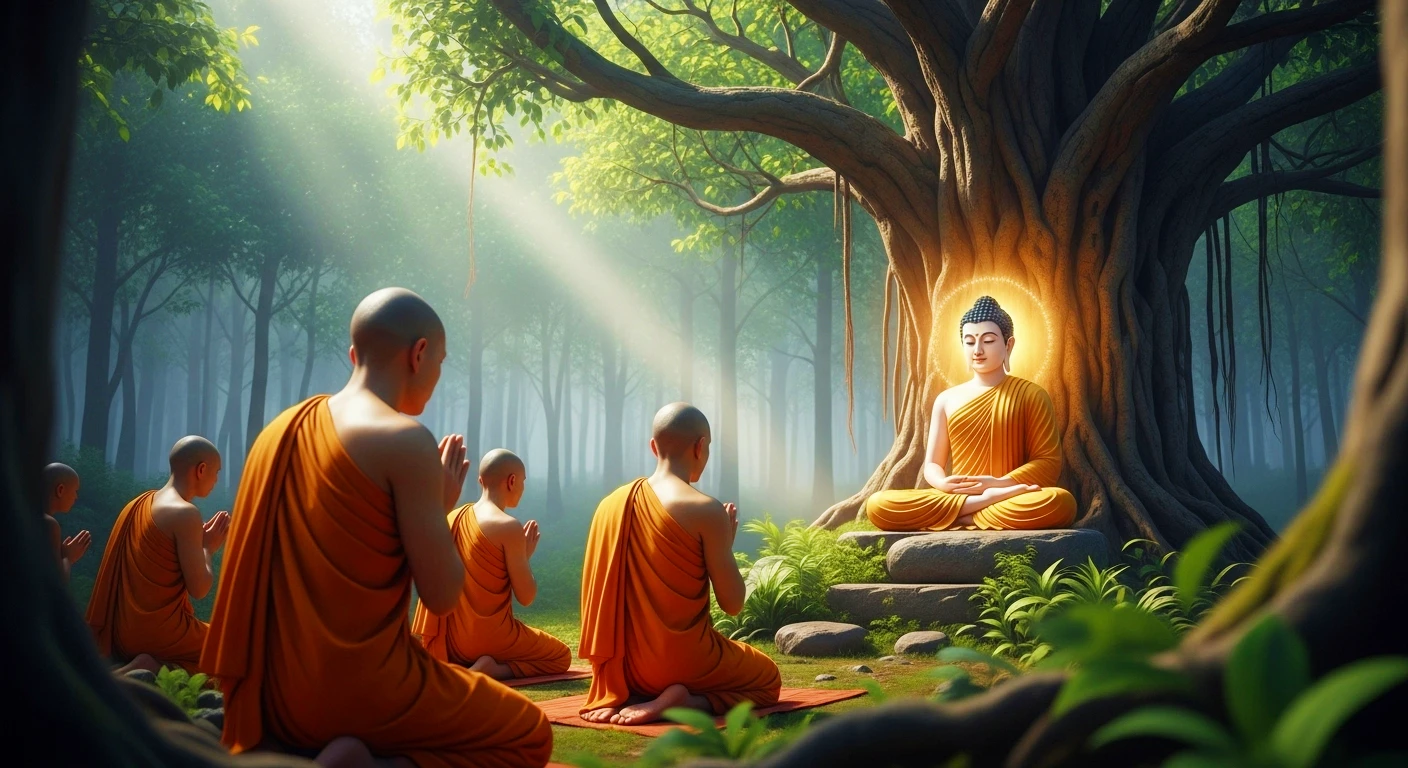
-
Save
Six Sakyan Princes, together with Upali The Barber, became Bhikkhus
The group of six princes comprising: (1) King Bhaddhiya, (2) Prince Anuruddha, (3) Prince Ānanda, (4) Prince Bhagu, (5) Prince Kimbila, (6) Prince Devadatta (Buddha’s brother-in-law) and Upali the barber, enjoyed earthly pleasures to the fullest, like devas enjoying celestial luxuries, for full seven days before they went out of the city, as though going out for joyful garden sports, escorted by regiments of elephanteers, cavalry, charioteers and infantry, On arrival at the border, the four regiments of the army were ordered to return while they went into the neighbouring country of Malla.
Once inside the country of Malla, the six princes took off their ornaments, wrapped them up with outer garments and handed the bundle to Upali, by way of a parting gift, saying: “My dear friend Upali, you may return home. This should keep you going to an advanced age.”
Upali, the barber, wept, rolling himself on the ground at the feet of the princes, as he was loath to part from his masters but he dared not disobey their command. So he was obliged to make his way home carrying the bundle of gifts. When Upali parted from his masters, there was a loud and fearsome noise, as if the large, thick forest wailed and the great earth quaked and trembled in lamentation.
A little while after Upali had separated from the princes, he stopped and thought to himself: “The Sakya royal families are harsh and ruthless. They might misjudge and wrongly conclude: ‘This barber, Upali, has dispatched the six princes’ and they might order me to be killed. If even these princes could abandon kingly luxuries and splendour, discarding priceless ornaments as they would spittle, to receive ordination, why a lowly, wretched person like me not be able to receive ordination.” So thinking and realizing, he took out the precious things he had brought and hanging them on a tree, said: “I have given up these properties to charity. Anyone who finds them is free to take them as he pleases.”
As soon as the six princes saw the barber, Upali, coming from a distance, they questioned: “O friend Upali, why have you returned to us?” Then he explained all that had occurred to him and what he had done. Then the princes told him:
“O Upali, your not going back to the royal city and returning to us is very good indeed! (As you have thought) members of the Royal Sakyan family are harsh and ruthless. (Supposing, you had returned) they might have had you executed under false impression that you had done away with the six princes.”
The six princes took Upali along with them to Anupiya mango grove where the Buddha was residing. On arrival, they respectfully paid homage to the Buddha, took their seat at places free from the six faults, and addressed Him thus:
“Most Exalted Buddha, we, Sakyan royalty, are harsh and stern with pride of births, this man, Upali, has been our servant for the past many years. We would beseech You to give him priority in receiving ordination before anyone of us. (By ordaining him in this way) the rest of us would have to make homage to him, greet him when he approaches, and pay our respect with raised hands. By so doing, our Sakyan pride of birth, so harsh and stern and the vanity of us, the Sakyan princes who have become bhikkhus, will be broken.
Then the Buddha had Upali, the barber, ordained first (as requested) and followed by the six princes.
The Buddha, accompanied by over twenty thousand bhikkhus, left Anupiya Mango Grove, near the village of Anupiya, in Malla country, for Veḷuvana monastery, in Rājagaha, where He observed the second rain-retreat together with twenty-thousand bhikkhus.
(From the book: The Great Chronicle of Buddhas | by Ven. Mingun Sayadaw
Queen Mahāpajāpati Gotamī renunciates the worldly life
Around four years after his first visit of the Supreme Buddha to Kapilavatthu, King Suddhodana became so ill. The King was in his later part of life. He finally became too weak to move, so he kept lying on his deathbed. At that moment, the King was a nun-retuner. But he was a very meritorious person whose merit has ripened to become an Arahant.
Thus, seeing the situation, the Supreme Buddha visited Kapilavatthu and preached Dhamma to His royal father. Having listened to the Buddha’s teaching, the king attained the final spiritual stage of Arahantship and passed away on that very day.
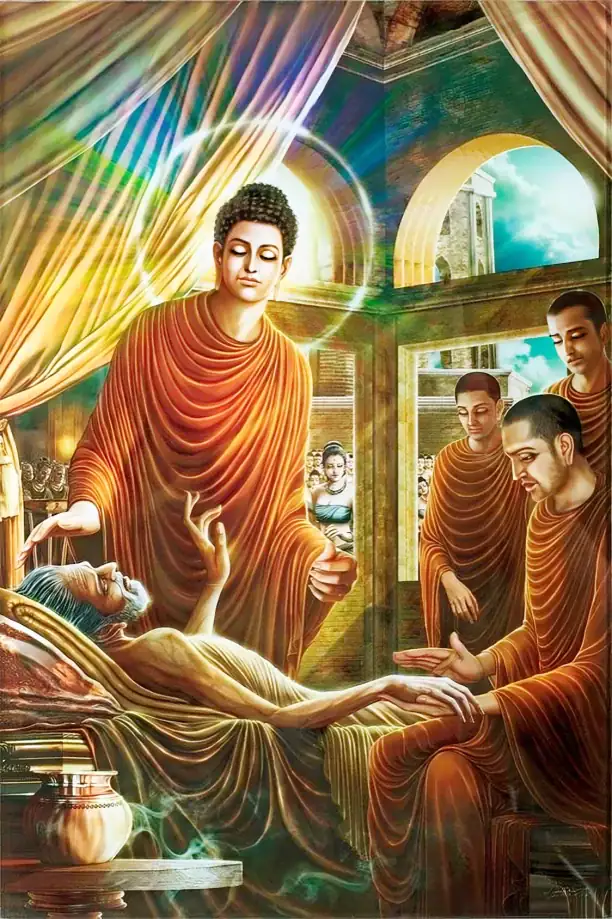
-
Save
Following the death of King Suddhodana, Maha Prajapati Gotami decided to go forth and get ordained as a Buddhist nun. However, by then the order of Buddhist nuns (bhikkhuni sasana) was not established as yet.
During a visit of the Buddha to Kapilavatthu to prevent an imminent battle between the Sakyan and Koliya tribes regarding the sharing of water of the river named Rohini, Maha Prajapati Gotami approached the Buddha and expressed her wish to become a Buddhist nun under the Buddha. Without indicating any specific reason, the Buddha refused to ordain her as a Buddhist nun and returned to a place called Vesali where the Buddha was residing in the Mahavana.
Following the resolution of the conflict between the Sakya and Koliya tribes regarding the water of the river Rohini, two hundred and fifty young men from each tribe who had listened to the Buddha’s teaching left the householder’s life to ordain under the Buddha.
The five hundred wives (of those young men) who became alone after the renunciation of their beloved husbands, lived with the desire of becoming nuns. They approached Maha Prajapati Gotami and asked her to make another request to the Buddha to allow them to become nuns.
This time, Maha Prajapati Gotami decided to shave her head, wear yellow robes and walk to Vesali where the Buddha was resident during the fifth rains retreat. The five hundred ladies also shaved their head, wore yellow robes and joined her to walk from Kapilavatthu to Vesali in order to request the Buddha to ordain them as nuns.
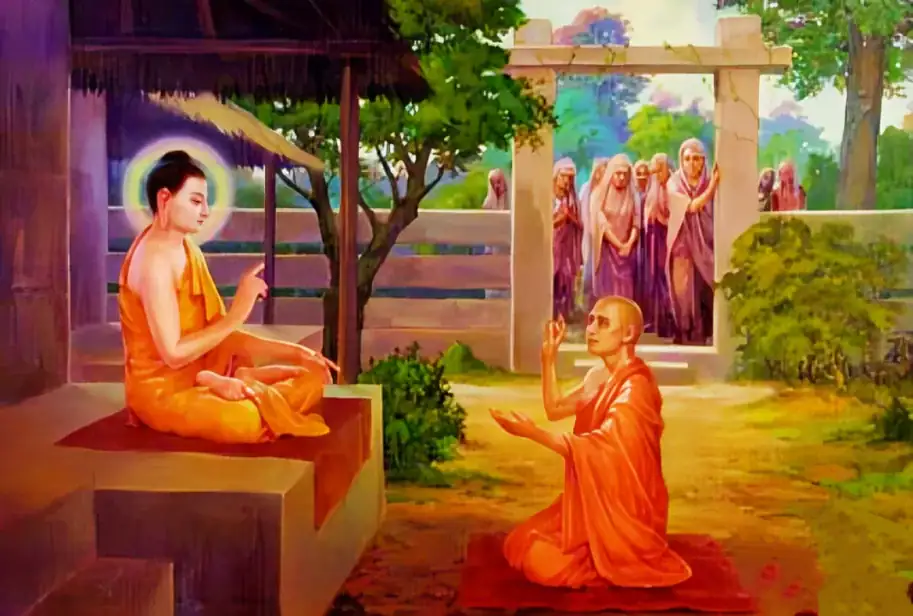
-
Save
When they finally arrived at the Mahavana in Vesali after their long walk on foot, they had swollen feet, their bodies and robes were smeared with dust and mud and they were tired and sad with tears rolling down their cheeks.
When Venerable Ananda, who was a cousin of the Buddha in their lay life, saw them with swollen feet, exhausted and dirty from their long walk and with tears in their eyes, he sympathized with them and decided to approach the Buddha on their behalf. Initially, the Buddha rejected his request three times.
But when Venerable Ananda asked whether it is possible for a woman to develop spiritually and gain enlightenment by leaving the domestic life and following the Buddhist path of liberation, the Buddha agreed that it was possible. Then he spoke on behalf of Maha Prajapati reminding the Buddha that it was she who as the foster mother brought up the Buddha when the Buddha’s mother passed away seven days after the child birth. He also pointed out the fact that the previous Buddhas had ordained women as nuns in the Buddhist dispensation. Venerable Ananda managed to persuade the Buddha who agreed to ordain them if Maha Prajapathi Gotami agreed to accept eight special conditions (garu dhamma) relevant to the nuns.
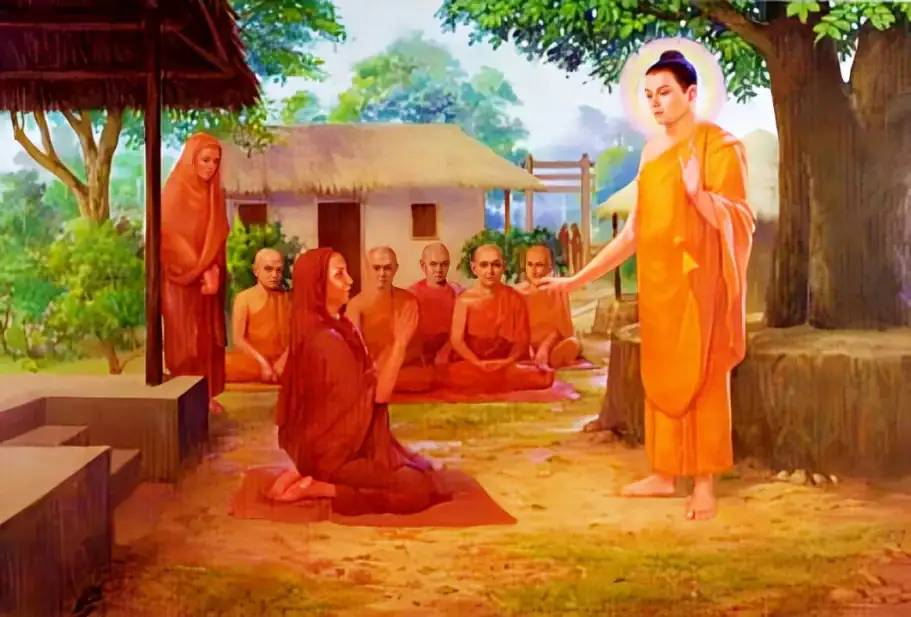
-
Save
The Eight Special Conditions (Ashtha Garu Dhamma)
1) A nun even if she has been ordained for one hundred years, must pay respect to a monk who is ordained even for a day.
2) A nun should spend the rains retreat (vassa) in communities of both monks and nuns.
3) A nun should consult the monks on Observance days.
4) At the end of the rains retreat a nun must invite (pavarana) both monks and nuns to discuss relevant matters such as what was seen, what was heard and what was suspected in relation to discipline.
5) A nun who has broken any of the rules of discipline must undergo penance for half a month under both monks and nuns.
6) When a nun has trained as a probationer for two years, she should obtain higher ordination (upasampada) from both nuns and monks.
7) A nun should not scold or abuse a monk.
8) A nun cannot advise a monk.
When Venerable Ananda mentioned the eight special conditions laid down by the Buddha to Maha Prajapati Gotami, she readily agreed to accept them. It is recorded that she herself was ordained by the Buddha through the acceptance of the eight conditions and that her five hundred companions were ordained by other monks on the instructions of the Buddha.
Thus, the order of the Buddhist nuns (bhikkhuni sangha) was formed around five years after the formation of the order of Buddhist monks (bhikkhu sangha) and Venerable Maha Prajapathi Gotami became the first Buddhist nun in the dispensation of the Gautama Buddha.
Not long after her ordination and having practised the Buddhist spiritual path with effort and vigour, Venerable Maha Prajapati Gotami attained the final supra mundane spiritual stage of Arahanthood associated with intuitive and analytical knowledge and super normal powers.
Service as a senior Buddhist nun
When Maha Prajapati Gotami and the five hundred accompanying ladies were ordained as nuns, the Lichchavi kings built a large nunnery in Vesali for them to reside. Arahant Maha Prajapati Gotami continued to live in that nunnery accompanied by the other five hundred nuns who had also become Arahants after listening to a sermon delivered by an Arahant monk named Nandaka.
Being the senior most enlightened nun from the Sakya clan, Arahant Maha Prajapati Gotami was able to help and mentor the five hundred nuns to adapt to the homeless life of a Buddhist nun and to practise the Buddhist path of liberation. She was often the role model for the newly ordained nuns teaching them the Buddhist doctrine and the rules of discipline to be observed as a nun. The Buddha recognised her service as a senior Arahant nun by declaring her to be the foremost Buddhist nun in seniority and experience.
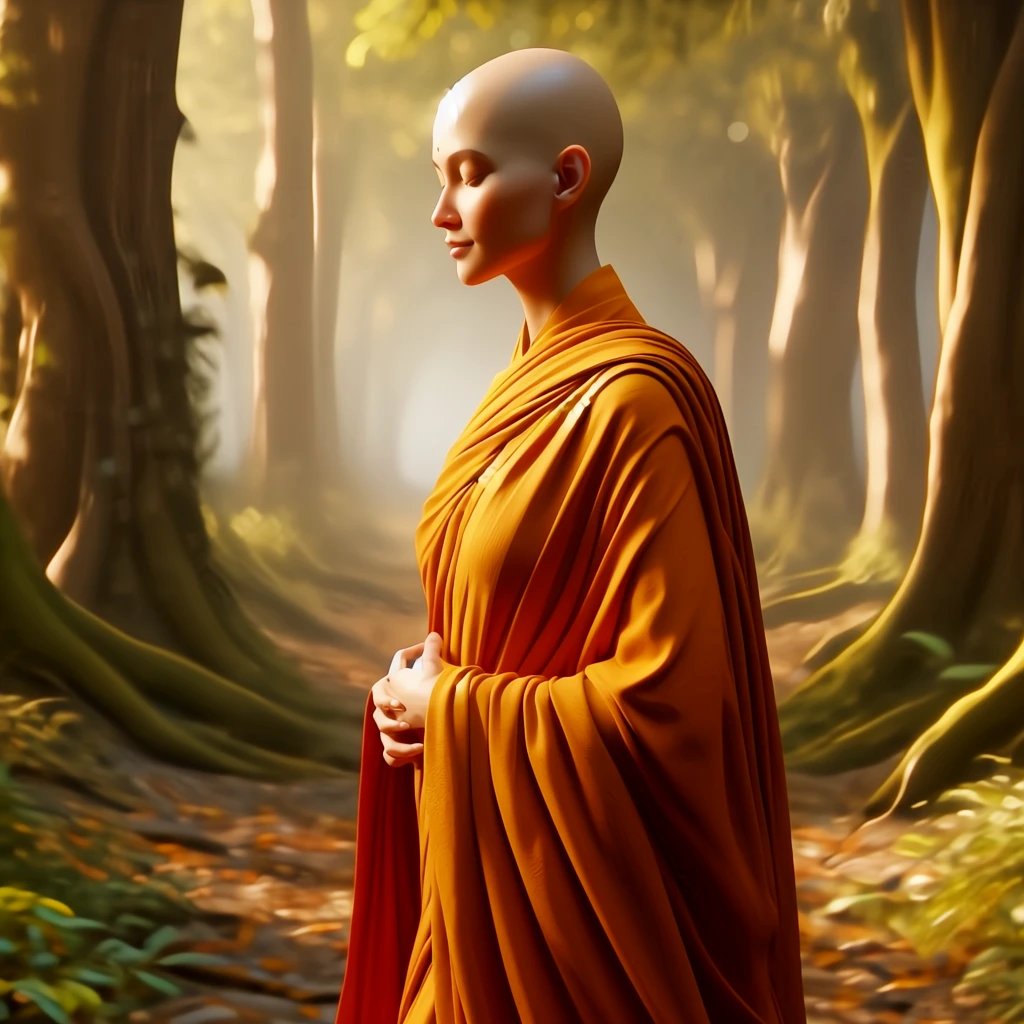
-
Save
Passing Away
When Arahant Maha Prajapati Gotami was one hundred and twenty years old, she reflected on her life and made the resolution to let her passing away take place after gaining permission from the Buddha. Her five hundred companion nuns also decided to pass away at the same time as their senior colleague. One day, the Buddha was visiting the Pinnacle hall in the city of Vesali accompanied by a large congregation of senior monks. Arahant Maha Prajapati Gotami accompanied by the five hundred nuns visited the Buddha and after exchanging greetings, related how she cared for Prince Siddhartha from the age of seven days and stated that the Buddha has paid His debt adequately by allowing her to be ordained as a nun and helping her to attain enlightenment as an Arahant.
“Venerable sir, I brought up your physical body but,
You brought up my spiritual body.
I fed you with breast milk but,
You fed me with the milk of the Dhamma,
To destroy suffering and Samsara.
It is a rare opportunity to see a Buddha.
I would like to view and pay homage
to your lotus like feet.
Please stretch forward your feet”
She venerated the Buddha’s feet and asked for forgiveness if any short coming had been there on her part and asked for the Buddha’s permission to pass away when the Buddha stated as follows;
“How can I ever forgive you when you have never done any wrong? You are the very epitome of goodness. What can I say to you who is poised for final Nibbana?”
To dispel any doubts that other people may have with regard to the spiritual attainments of Arahant Maha Prajapati Gotami, the Buddha requested her to demonstrate her spiritual powers which she did by rising into the air. Having demonstrated her spiritual powers along with her five hundred companion nuns, she came down and paid homage to the Buddha three times before leaving the Buddha by walking backwards. Arahant Maha Prajatapati Gotami arrived back at the nunnery and developed Jhanas through meditation and attained final Nibbana by passing away. It is said that when the news of her imminent passing away spread around, many senior Arahant monks and nuns such as Arahants Sariputta, Maha Moggallana, Nanda, Rahula, Khema and Uppalavanna arrived in Vesali to pay homage to her. Venerable Ananda, who was still only a Stream Enterer (sotapanna) and was a nephew of Arahant Maha Prajapati Gotami, had wept profusely about her final passing away.
The Lichchavi kings of Vesali had arranged the remains of Arahant Maha Prajapati Gotami to be placed in a golden casket which was carried in a procession through the city of Vesali. It is recorded that as a means of paying respect and gratitude to the foster mother who brought Him up following the death of the natural mother Queen Mahamaya, the Buddha walked behind the casket containing the last remains of Arahant Maha Prajapati Gotami which the Buddha has never done on any other occasion.
The funeral of Arahant Maha Prajapati Gotami is considered to be more significant than the funeral of the Buddha as it was venerated by the Buddha as well as the two chief disciples. After the funeral, the relics of Arahant Maha Prajapati Gotami were collected by Venerable Ananda and handed over to the Buddha who then handed them over to the Lichchavi kings. The kings made arrangements to build a stupa in which the relics of Arahant Maha Prajapati Gotami were enshrined.
Arahant Maha Prajapati Gotami’s Theri gatha
The Theri gatha of the Khuddaka Nikaya (collection of the Buddha’s minor discourses), contains the verses by the senior Arahant nuns who reflect on their spiritual journey and their attainments. The following Theri gatha by Arahant Maha Prajapati Gotami are a reflection of her enormous respect and gratitude to the Buddha;
1) . The Buddha, the Great Hero, and the best of all beings, I pay my homage to you. It was you who released me and many other people from the suffering of cycle of rebirths.
2) . I understood suffering; removed completely craving, the cause of suffering; developed the Noble Eightfold Path and attained Nibbāna, the cessation of suffering.
3) . Not knowing the true nature of life, as a helpless being journeying on saṁsāra, at different times I was your mother, son, father, brother and grandmother.
4) . I have indeed seen the Blessed One through the Dhamma. I am bearing my final body. Journeying on from birth to birth has been eliminated. There is no more rebirth for me.
5) . Look at the monks, the harmonious disciples of the Buddha putting forth energy, giving the Dhamma practice top priority with strong effort. Rejoicing in their effort is the true Buddha vandana.
6) . Truly Queen Māyā gave birth to Gautama Supreme Buddha for the well-being of many. That is indeed how the mass of suffering of those beings who are struck by sickness and death is thrust away.
Having being born into a royal family as a sister of the mother of Prince Siddhartha, a Samma Sambuddha aspirant (bodhisattva), Arahant Maha Prajapati Gotami had the responsibility of bringing up Prince Siddhartha from the tender age of seven days.
She became a Stream Enterer (sotapanna) fairly soon after the enlightenment of the Buddha, but she waited till her husband’s death before deciding to become a nun. She had to face certain initial obstacles before the Buddha established the order of nuns and once it was established, she was recognised as the foremost nun in seniority and experience. She attained Arahantship and continued to teach, mentor and provide spiritual guidance to other nuns until her final passing away at the age of one hundred and twenty years. It is notable that her husband and both children, Nanda and Sundari Nanda had also attained the final supra mundane stage of Arahantship.
Arahant Maha Prajapati Gotami will be remembered with much respect and gratitude for a long time to come as the senior most nun who persevered with determination to establish the order of nuns in order to provide the spiritual opportunities to women.
(From the Article: Arahant Maha Prajapati Gotami: The Foremost Buddhist Nun in Seniority | By Dr. Ari Ubeyekara
